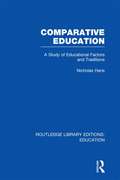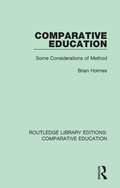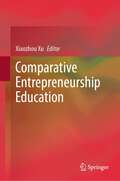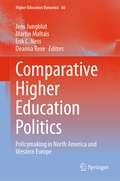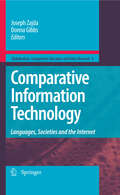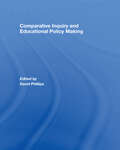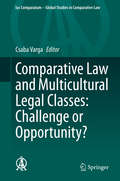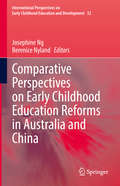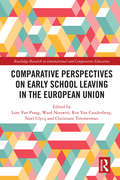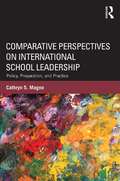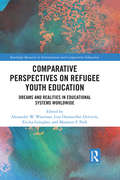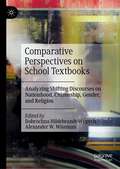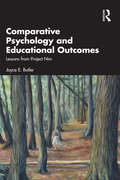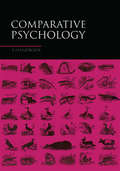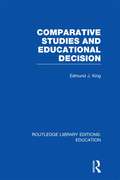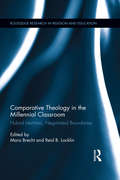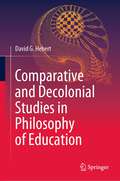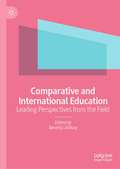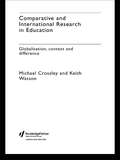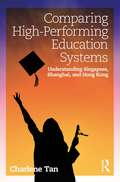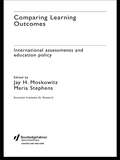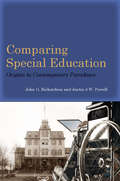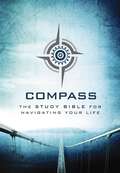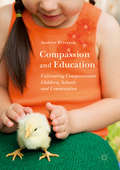- Table View
- List View
Comparative Education: A Study of Educational Factors and Traditions (Routledge Library Editions: Education)
by Nicholas HansThis book is divided into four parts. In Part One the author considers the natural factors which have influenced the various national systems of education. They comprise racial, linguistic, geographical and economic factors. In Part Two he considers the contribution of religious traditions to education, more particularly those of the Catholic and Puritan faiths, and in Part Three the secular traditions of humanism, socialism and nationalism. Finally in Part Four a comparison is made of the systems of education in England and Wales, the USA, France and the Soviet Union.
Comparative Education: Some Considerations of Method (Routledge Library Editions: Comparative Education #6)
by Brian HolmesOriginally published in 1981. Presented here is a coherent theory of Comparative Education research, based on the traditions and innovations established by such pioneers as Joseph Lauwerys and Nicholas Hans. From the author’s substantive studies emerges a taxonomy for education based on Popper’s critical dualism, and a way of analysing problems based on Dewey's reflective thinking and the social change theories of people such as Marx, Ogben and Pareto. Models of formal organisations drawn from Talcott Parsons show how systems analyses can be made in comparative perspective and how the processes of policy formulation, adoption and implementation can be studied. The use of ideal typical normative models illustrates how comparative educationists can penetrate aspects of man's socially created worlds. These techniques are exemplified in succinct models against which debates about education in Western Europe (Plato), the USA (Dewey) and the USSR (Marx, Engels and Lenin) can be analysed. Against the crude use of comparative arguments and transplantation of foreign practices, Dr Holmes suggests that problems should be analysed and the outcomes of hypothetical solutions or policies should be tested under identified national circumstances. The distinctive feature of this book is that it takes account of the debate among social scientists, rejects both induction and ethnomethodology as adequate in themselves and brings together the problem-solving approach favoured by American research workers and the hypothetico-deductive method of enquiry advocated by natural scientists such as Sir Peter Medawar and Sir John Eccles.
Comparative Entrepreneurship Education
by Xiaozhou XuThis book systematically compares the innovation and entrepreneurship education (IEE) in the United States, the United Kingdom, Finland, Germany, Croatia, Canada, South Korea, and China. The book invites the most distinguished professors of each country in this field to contribute. It provides a context analysis that can lead to greater insight into why and how IEE has become an important government agenda and an institutional priority in different country settings. Following the context, each chapter analyzes governmental policies and the guidance of entrepreneurship education in recent years. This book also analyzes the internal development and supporting system of IEE from an ecosystem perspective. Based on the comparison of case countries, the book puts forwards the common successful experience and the differentiation of IEE.
Comparative Higher Education Politics: Policymaking in North America and Western Europe (Higher Education Dynamics #60)
by Erik C. Ness Jens Jungblut Martin Maltais Deanna RexeThis volume provides an overview of the state of the art of research on the politics of higher education policy in Canada, the US, and Western Europe. Each thematic chapter combines an extensive literature review with original empirical work that further advances our understanding of policymaking dynamics in higher education.The book covers five key aspects of policymaking, namely the politics of governance as well as funding reforms, the role of interest groups, policy diffusion, and policy framing. These aspects are explored using a unique comparative design that combines comparisons within as well as between regions, and among the five key aspects of policymaking. The conceptual framework is anchored in approaches from institutional theory, namely sociological and historical institutionalism.“This rare book coherently focuses on the same critical challenges that higher education faces in a changing global and national environment. These include vital governance and finance issues and how these are framed and contested by different organizations and interest groups as well as state actors. Within a broad institutionalist framework that reflects the tensions between historical university and national legacies on the one hand and regional and global influences on the other, the authors focus on policymaking in Western Europe, Canada, and the US. This is an engaging and creative endeavor, a must-read for scholars and policymakers alike.”Francisco O. Ramirez, Graduate School of Education Stanford University“This is a real achievement that will contribute to the development of research in politics of higher education policy, finance, and economic development. It is timely in an era when higher learning is increasingly salient to national policy, interest groups, and supranational bodies such as the EU. The focus on Canada, the US, and Europe frames a comparative approach to a competitive higher educational policy arena that has not received systematic study."Sheila Slaughter, Louise McBee Institute of Higher Education, University of Georgia“This fills a gaping hole in research on the politics of higher education. In bringing together research perspectives from governance studies with comparative public policy as well as scholars from Europe and Northern America, this volume will serve as an important reference point for a rapidly growing research field. The exceptionally high quality of editorship is documented by the fact that the chapters are convincingly subsumed under five sub-themes. In short: A must-read for any researcher and student interested in understanding the political foundations of higher education.”Marius R. Busemeyer, Department of Politics and Public Administration, University of Konstanz
Comparative Information Technology: Languages, Societies and the Internet (Globalisation, Comparative Education and Policy Research #4)
by Joseph Zajda Donna GibbsThis volume offers a critique of the nexus between ICT and its impact on society, individuals and educational institutions. One of the most significant dimensions of globalisation has been the rapid development of information and communications technologies (ICTs). Our lives have been changed by ICTs in numerous ways and the implications for education are enormous. The ICTs have transformed the linguistic, cognitive and visual dimensions of human communication, as well as our perceptions of the self, and social identity in the global culture. They have facilitated the development of new dimensions of digital literacy, such as blogging and sms messaging. In this sense, cyberlanguage continues to evolve by borrowing and adapting familiar words, coining new expressions, and embracing particular styles. The book provides directions in education and policy research, relevant to transformational educational reforms in the 21st century.
Comparative Inquiry and Educational Policy Making
by David PhillipsBuilding on an increasingly sophisticated body of research on policyborrowing in education, this collection explores ways in which the foreign example in education has been and is being used by policy makers in a variety of settings, its principal aim being to assess the usefulness offoreign experience inhome contexts.
Comparative Law and Multicultural Legal Classes: Challenge or Opportunity? (Ius Comparatum - Global Studies in Comparative Law #46)
by Csaba VargaThis book discusses legal education in multicultural classes. Comparative law education is now widespread throughout the world, and there is a growing trend in developed countries toward teaching global law. Providing theoretical answers on how to describe each legal culture and tradition side-by-side, it also explores educational methodological options to address these aspects without causing offence or provoking tension within a multicultural student community. The book examines nine countries on three continents, bringing together academic views and educational insights from ten scholars in the field of comparative law.
Comparative Perspectives on Early Childhood Education Reforms in Australia and China (International Perspectives on Early Childhood Education and Development #32)
by Berenice Nyland Josephine NgThis book has been designed to add to the study and experience of early childhood ideas and experience in an international context. The focus is Australia and China with three research projects explored to provide insights into the history and development of early childhood education in each country. The work offers a consideration of the complexity of early childhood education in local and global contexts, at a time when global relationships can benefit from moving beyond better cultural understandings to greater connections and reciprocity. Each study has accompanying empirical data to support the interpretations offered. The first part of the book presents historical context and examines policy issues, the growth of the early childhood education workforce and the development of curriculum approaches in each country. The two projects that follow describe teachers’ perspectives of children’s learning and an in-depth study of a collaborative higher education program that details stakeholder experiences. By studying participant attitudes and ideas in each country we have been able to share early childhood knowledge and discuss perspectives through early childhood languages, like perspectives on the role, importance and nature of play and learning.
Comparative Perspectives on Early School Leaving in the European Union (Routledge Research in International and Comparative Education)
by Christiane Timmerman Noel Clycq Lore Van Praag Ward Nouwen Rut Van CaudenbergEarly School Leaving in the European Union provides an analysis of early school leaving (ESL) in nine European Union countries, with a particular focus on young people who were previously enrolled in educational institutions inside and outside mainstream secondary education. The comparative approach employed by this volume adds to the existing body of knowledge on ESL and develops an understanding of how young people navigate through different educational systems. <P><P>Contributors acknowledge the importance of reconstructing educational trajectories from the perspective of the individuals involved and, as a result, the book includes data collected during in-depth interviews, surveys, and insights from educational professionals, policymakers and representatives from civil society organisations. Adopting a classic tripartite approach, which acknowledges the complex nature of ESL, the book addresses individual, institutional and systemic factors. It identifies and analyses the prevention, intervention and compensation measures that can succeed in supporting young people’s attainment, and demonstrates how these can be used to reduce ESL. <P><P>This unique book will be highly relevant for academics, researchers and postgraduate students, as well as educational practitioners. Drawing on the insights provided by the authors, the book formulates policy recommendations that should also be of interest for policymakers in European countries and beyond.
Comparative Perspectives on International School Leadership: Policy, Preparation, and Practice
by Cathryn S. MagnoThrough a multi-country study, Comparative Perspectives on International School Leadership examines the current global spread of educational leadership, occurring rapidly and widely. Exploring five international case studies of leadership policy, preparation, and practice under the framework of policy borrowing and adaptation, Magno attempts to understand and account for commonalities and differences across country contexts. Rather than assuming a particular model or theory to leadership is best, Comparative Perspectives on International School Leadership takes a policy-oriented perspective and considers how and why certain approaches are being formulated and accepted, including an examination of motivations, influencers, actors, institutions, and implementation processes. Magno ultimately argues that efforts toward formalizing educational leadership reflect current global political objectives to improve schools by increasing accountability, transparency, and professionalism. This engaging book will be of interest to scholars and students in the fields of educational leadership and comparative education.
Comparative Perspectives on Refugee Youth Education: Dreams and Realities in Educational Systems Worldwide (Routledge Research in International and Comparative Education)
by Alexander W. Wiseman Lisa Damaschke-Deitrick Ericka L. Galegher Maureen F. ParkThis volume explores the shared expectations that education is a panacea for the difficulties that refugees and their receiving countries face. This book investigates the ways in which education is both a dream solution as well as a contested landscape for refugee families and students. Using comparative, cross-national perspectives across five continents, the editors and contributors critically analyze the educational structures, policies, and practices intended to support refugee youth transition from conflict and post-conflict zones to mainstream classrooms and schools in their new communities.
Comparative Perspectives on School Textbooks: Analyzing Shifting Discourses on Nationhood, Citizenship, Gender, and Religion
by Alexander W. Wiseman Dobrochna Hildebrandt-WypychThis book examines the discourses on nation-building, civic identity, minorities, and the formation of religious identities in school textbooks worldwide. It offers up-to-date, practical, and scholarly information on qualitative and mixed-method textbook analysis, as well as the broader context of critical comparative textbook and curriculum analyses in and across selected countries. The volume offers unique and empirical research on how internal educational policies and ideological goals of dominant social, political, and economic groups affect textbook production and the curricular aims in different educational systems worldwide. Chapters address the role of school textbooks in developing nationhood, the creation of citizenship through school textbooks, the complexity of gender in normative discourses, and the intersection of religion and culture in school textbooks.
Comparative Psychology and Educational Outcomes: Lessons from Project Nim
by Joyce E. ButlerComparative Psychology and Educational Outcomes is designed to empower educators to lead with wisdom, strengthen their belief that all students can learn at high standards, and create a vision of excellence that becomes actionable, allowing us to be difference makers in the lives of all learners.The framework of the Logic Model creates a road map for how to analyse the effectiveness of our instruction. This model offers a systematic approach for determining the root cause analysis of an identified challenge, avoiding the pitfall of enacting a solution before we have named the challenge, thereby perpetuating inadequate learning outcomes. This text presents case studies to demonstrate how this analytic process can be used to examine and strengthen literacy and social intelligence skills, including the exploration of a variety of teaching and learning frameworks. This text builds a bridge between the research and a school’s identified challenge, allowing for systemic and systematic change that meets the needs of the identified challenge, guided by the experts in our field.Connecting evidence-based strategies with day-to-day practice, this book is aimed at educational leaders (principals, superintendents, special education directors, teachers) in their role as practitioners and those working toward their certifications in the university setting.
Comparative Psychology: A Handbook
by Gary Greenberg Maury M. HarawayAre bird songs learned or genetically programmed? Howdo animals attract the opposite sex? How does playaffect development? How do wolves signal surrender?Which animals have been observed using tools? Dosquirrels ever forget food caches? How do beesdifferentiate between hives? Can some animals count?Examines the state of the art-and itsevolution Exploring the full range of animal behavior studies, this authoritative Handbook covers the current state of the art as well as important historical developments in the field since its beginnings over a century ago. It features original essays by comparative psychologists and other animal behavior researchers in experimental psychology who examine and report on the latest research and discoveries in the areas of evolution, development, and species-typical behavior. Discusses all other major approaches to animalbehavior The Handbook is the only major reference work to offer a unique psychological perspective of the field. It is also the only one to provide numerous examples of other major approaches to animal behavior, and to discuss and compare them. Arranged in eight major sections for quick and efficient information retrieval, the Handbook: Covers the history and philosophical foundations of comparative psychology, spotlights key figures, and provides international perspectives. Surveys all the important concepts, issues, and theoretical developments in the field.Addresses the latest methodology, focusing on apparatus, research design, statistical techniques, and zoo research. Deals with physiological correlates of behavior, hormones, pheromones, sensation and perception, and sleep.Provides intensive examinations of the behavior of a wide variety of species and groups of animals, from cephalopods and insects to wolves and primates. Covers the key psychological processes of learning and development of behavior, a major emphasis of the field that distinguishes it from other approaches. Treats the full range of functional behaviors by which individuals and species ensure survival and reproductive success. Analyzes cognitive processes, describing complex patterns of behavior in terms of information processing and use. Ideal as a source book for students in comparative psychology, ethology, sociobiology, anthropology, and evolutionary psychology, the Handbook is also a handy reference for scientists working in these fields and for the lay person who wants to understand animal behavior.
Comparative Psychology: A Handbook (Research In Developmental And Comparative Psychology Ser. #2)
by Gary Greenberg and Maury M. HarawayAre bird songs learned or genetically programmed? How do animals attract the opposite sex? How does play affect development? How do wolves signal surrender? Which animals have been observed using tools? Do squirrels ever forget food caches? How do bees differentiate between hives? Can some animals count? Examines the state of the art-and its evolution Exploring the full range of animal behavior studies, this authoritative Handbook covers the current state of the art as well as important historical developments in the field since its beginnings over a century ago. It features original essays by comparative psychologists and other animal behavior researchers in experimental psychology who examine and report on the latest research and discoveries in the areas of evolution, development, and species-typical behavior. Discusses all other major approaches to animal behavior The Handbook is the only major reference work to offer a unique psychological perspective of the field. It is also the only one to provide numerous examples of other major approaches to animal behavior, and to discuss and compare them. Arranged in eight major sections for quick and efficient information retrieval, the Handbook: Covers the history and philosophical foundations of comparative psychology, spotlights key figures, and provides international perspectives. Surveys all the important concepts, issues, and theoretical developments in the field.Addresses the latest methodology, focusing on apparatus, research design, statistical techniques, and zoo research. Deals with physiological correlates of behavior, hormones, pheromones, sensation and perception, and sleep.Provides intensive examinations of the behavior of a wide variety of species and groups of animals, from cephalopods and insects to wolves and primates. Covers the key psychological processes of learning and development of behavior, a major emphasis of the field that distinguishes it from other approaches. Treats the full range of functional behaviors by which individuals and species ensure survival and reproductive success. Analyzes cognitive processes, describing complex patterns of behavior in terms of information processing and use. Ideal as a source book for students in comparative psychology, ethology, sociobiology, anthropology, and evolutionary psychology, the Handbook is also a handy reference for scientists working in these fields and for the lay person who wants to understand animal behavior.
Comparative Studies and Educational Decision (Routledge Library Editions: Education)
by Edmund J. KingThis volume offers a conceptual justification and methodology for comparative studies of education matching developments in the social sciences and other comparative disciplines. It also relates comparative studies of education to the practical business of policy formulation at all levels. Thus it bridges the widening gap between the purely academic world and the world of decision for development. The author draws illustrations from educational reforms, but goes further in suggesting suitable procedures or institutions which might achieve soundly based policies and secure their implementation. He takes account of the planning techniques and achievements of UNESCO, OECD and other international organizations, and examines the activities and aims of national planning for education in a wider perspective of world re-orientation.
Comparative Theology in the Millennial Classroom: Hybrid Identities, Negotiated Boundaries (Routledge Research in Religion and Education #5)
by Mara Brecht Reid B LocklinThis volume explores the twenty-first century classroom as a uniquely intergenerational space of religious disaffiliation, and questions about how our work in the classroom can be, and is being, re-imagined for the new generation. The culturally hybrid identity of Millennials shapes their engagement with religious "others" on campus and in the classroom, pushing educators of comparative theology to develop new pedagogical strategies that leverage ways of seeing and interacting with their teachers and classmates. Reflecting on religious traditions such as Islam, Judaism, African Traditional Religions, Hinduism, Christianity, and agnosticism/atheism, this volume theorizes the theological outcomes of current pedagogies and the shifting contours of comparative theological discourse.
Comparative and Decolonial Studies in Philosophy of Education
by David G. HebertThis book introduces the educational philosophies of notable African and Asian thinkers who tend to be little recognized in Europe and North America. It offers specific resources for diversification of higher education curricula. The book expands the philosophy of education, in clear language, to include ideas of major non-western educational thinkers who are little discussed in previous publications. It includes critical analysis of non-western concepts and consideration of their relevance to schools worldwide. The book features discussions of how the work of Tagore and postcolonial thinkers offers diverse visions that increasingly inspire a decolonizing approach to education. This book offers a unique emphasis on how a decolonized philosophy of education can especially enable a rethinking of approaches to education in arts and humanities subjects.
Comparative and International Education: Leading Perspectives from the Field
by Beverly LindsayFeaturing a foreword penned by Ambassador (Ret) and Professor Emeritus Horace G. Dawson, this volume articulates the significance of comparative and international education and affairs as experienced by elected Fellows of the Comparative and International Education Society—including some as Fellows of the American Association for the Advancement of Science and the International Academy of Education. Based upon their decades of multiple research modalities and senior administrative engagements with universities, USAID, National Science Foundation, World Bank, Fulbright, and other agencies, the Fellows explicate critical historical phenomena and postulate how future directions of the field may evolve. The volume expounds the salience of cross cutting and interdisciplinary themes by analyzing how the social sciences, humanities, and international affairs have affected the evolving nature of the field. Pedagogical epistemologies, public and educational policies, and paradigms emerge from applied research as new motifs are presented in view of geopolitical and global affairs that will affect education in coming decades.
Comparative and International Research In Education: Globalisation, Context and Difference (Bristol Papers In Education: Comparative And International Studies)
by Michael Crossley Keith WatsonFrom the foreword: This book is a major contribution to the field of comparative and international education. It has been co-authored by two distinguished figures, who write with authority and clarity, and who present conceptual insights which add creative and intellectual vitality to the field at a time of major change and development.Changing geopolitical relations, the acceleration of globalisation and major advances in information and communication technology have all transformed and revitalised international and comparative research in education. This multidisciplinary book critically examines the implications of this change for those engaged in such work worldwide. Groundbreaking and insightful, it draws on the latest research and developments in the field to give a comprehensive overview and analysis of the contemporary condition of this valuable form of research.Drawing upon the authors' extensive international experience, the text:* Re-assesses the diverse and multidisciplinary origins of this field of study:* Documents the increased orientation towards research;* Explores the changing nature of the problems and issues faced by both new and experienced researchers;* Puts forward a coherent and well-informed case for a thorough reconceptualisation of the field as a whole.The book argues eloquently for increased cultural and contextual sensitivity in educational research and development in order that the field might make a more effective contribution to educational theory, policy and practice. This multidisciplinary work will be welcomed by a wide range of theorists and researchers in education and the social sciences, as well as teachers, policymakers and anyone concerned with improving dialogue and understanding across cultures and nations.
Comparing High-Performing Education Systems: Understanding Singapore, Shanghai, and Hong Kong
by Charlene TanComparing High-Performing Education Systems provides original insights into the educational structures, ideologies, policies, and practices in Singapore, Shanghai, and Hong Kong. Taking as its basis their global reputation and consistently strong performance in formal assessments, the author provides an in-depth analysis and comparison of these three education systems that draws on cutting-edge research. Chapters explore the dominant cultural and educational norms in Singapore, Shanghai, and Hong Kong to give a wider picture of these high-performing education systems. The performance of students in international large-scale assessments such as Programme for International Student Assessment (PISA), Trends in International Mathematics and Science Study (TIMSS), and Progress in International Reading Literacy Study (PIRLS) is considered, alongside an exploration of attitudes to schooling, tutoring, and assessment. The book shows how Singapore, Shanghai, and Hong Kong exemplify an East Asian Educational Model (EAEM). Such a model – is rooted in and shaped by Confucian habitus: unconscious and ingrained worldviews, dispositions, and habits that reflect the standards of appropriateness in a Confucian Heritage Culture; aspires high performance: a balance between academic excellence and holistic development; and utilises educational harmonisation: the art of bringing together different and contradictory means and ends to achieve desired educational outcomes. Informative and thought-provoking, this book is a useful reference for policymakers, researchers, educators, and general readers on high-performing education systems, school reforms in East Asia, Confucian influences on education, and cross-cultural policy learning and transfer.
Comparing Learning Outcomes: International Assessment and Education Policy
by Maria Stephens Jay H. MoskowitzComparing Learning Outcomes provides an insider's look at the policy and practical issues in conducting and using the information from international assessments of education and is a key resource for researchers and policymakers in education.This book covers a variety of important topics related to international comparative assessment including:* History of international assessment, the factors contributing to its growth and the impacts of such growth* What it means to assess different domains* How information form international assessments has been used by policy makers in different countries* Technical considerations in analysing and using assessment data.Reflecting the increasing involvement of policy makers in the field of international education assessment Comparing Learning Outcomes brings together the collaborative research of professionals in 11 countries working on a project for the OECD (Organisation for Economic Cooperation and Development), gathering cross-national, comparative information on education for use for governments.
Comparing Special Education
by John G. Richardson Justin J. W. PowellIn today's schools the number of students who receive additional resources to access the curriculum is growing rapidly, and the ongoing expansion of special education is among the most significant worldwide educational developments of the past century. Yet even among developed democracies the range of access varies hugely, from one student in twenty to one student in three. In contemporary conflicts about educational standards and accountability, special education plays a key role as it draws the boundaries between exclusion and inclusion. Comparing Special Educationunites in-depth comparative and historical studies with analyses of global trends, with a particular focus on special and inclusive education in the United States, England, France, and Germany. The authors examine the causes and consequences of various institutional and organizational developments, illustrate differences in forms of educational governance and social policy priorities, and highlight the evolution of social logics from segregation of students with special educational needs to their inclusion in local schools.
Compass: The Study Bible for Navigating Your Life
by Thomas NelsonCompass is about helping you find the answers you're looking for in the pages of the Scriptures and allowing that truth to navigate your life. Packed with Bible-reading study helps and using an energizing, new Bible translation, Compass is a Bible designed with you in mind. Do you want to start reading and applying the Bible to your life, but aren't quite sure where to start? Let Compass point you in the right direction.Features include:In-text notes that include cultural, historical, theological, and devotional thoughtsGod's Promises® - Thomas Nelson's bestselling guide to Scripture for your every needBook introductionsReading plans for every day of the yearTopical guides to Scripture and notesIn-text mapsPart of the Signature Series line of Thomas Nelson Bibles
Compassion and Education: Cultivating Compassionate Children, Schools and Communities
by Andrew PetersonThis book makes a defence of compassion as an essential and significant quality that should be at the heart of the education of young people. It provides a careful exploration of what compassion means; how it is relevant to the various relationships among students, teachers, and the wider community; and the particular pedagogical processes that can and might develop compassion. Understanding and justifying compassion as a virtue, this book argues that compassion is a virtue central to all human relationships from the familial, to the communal and to the global. It will be of interest to academics, research and students of education.
